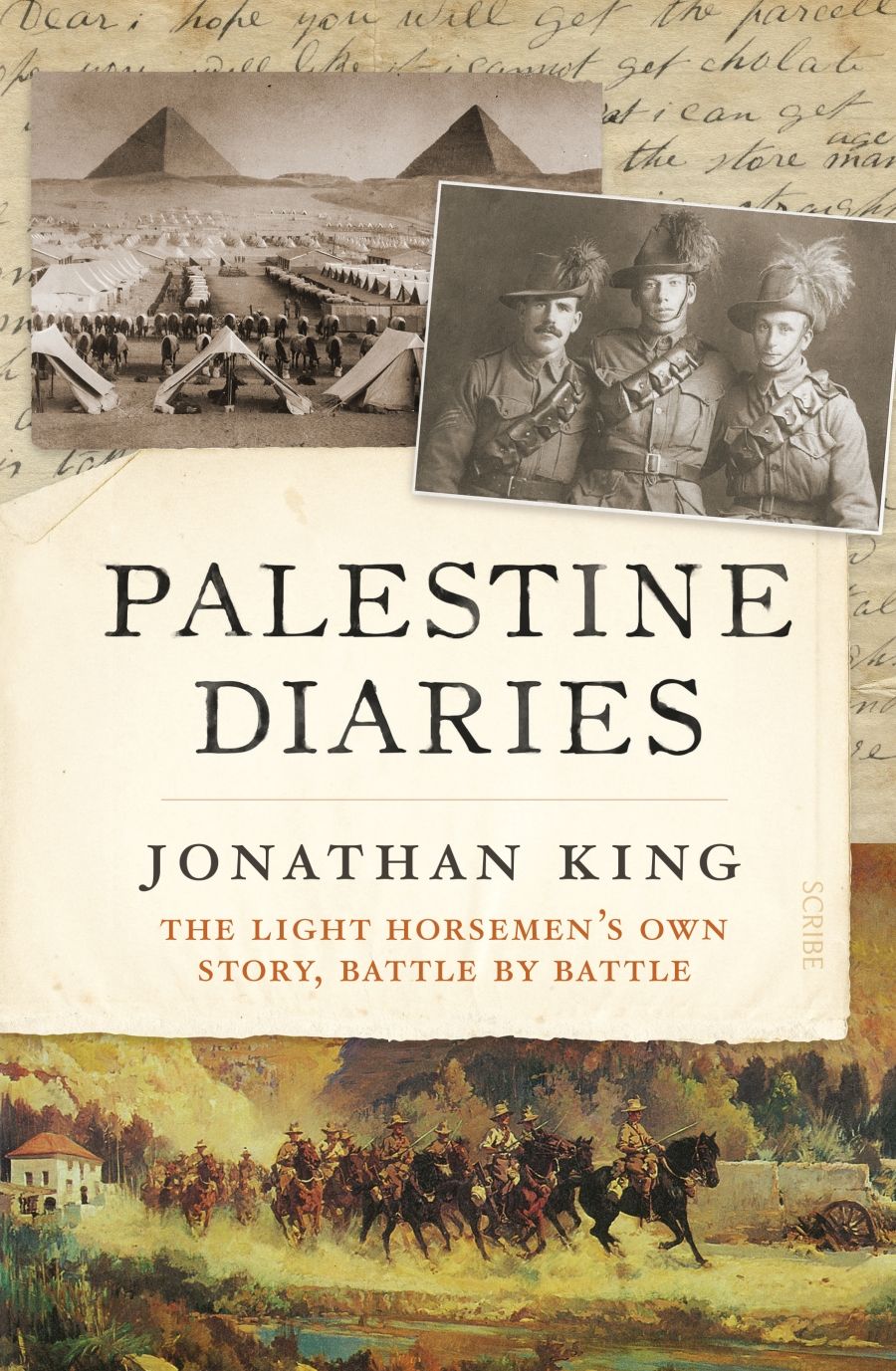
- Free Article: No
- Contents Category: Military History
- Custom Article Title: Martin Crotty reviews 'Palestine Diaries: The light horsemen’s own story, battle by battle' by Jonathan King
- Custom Highlight Text:
Australia’s role in the war against the Ottoman Empire from 1916 to 1918 is much less widely understood than its contribution to the doomed campaign in the Dardanelles or the muddy slog on the Western Front. It is one aspect of Australia’s World War I that has not been overwritten by historians ...
- Book 1 Title: Palestine Diaries
- Book 1 Subtitle: The light horsemen’s own story, battle by battle
- Book 1 Biblio: Scribe, $39.99 pb, 448 pp, 9781925322668
But King almost totally ignores anything beyond the immediate. There is no overview of the grand strategies that were employed by the different sides, and no explanation of why the British considered it important to fight the Ottomans at a time when the Western Front was crying out for all the manpower and equipment that could be gathered. Military and political strategies and plans, even tactics, barely rate a mention. There are hardly any statistics provided about matters of such basic importance as how many Australians fought there and how many casualties ensued. There is nothing on what proportion of the overall Eastern Expedition Force the Australians formed, nor on what other national forces besides the New Zealanders and the British were involved. Perhaps the fact that the Light Horse were such a small part of the bigger effort was something King preferred to let slip by his readers.
And there is nothing but silence from the Turkish side. King barely mentions their aims and objectives, the difficulties they suffered in conducting their war effort, their perceptions of the Anzacs, or the experience of being defeated and occupied. They are there only as bit players, an unwanted but necessary part of the stage on which the Anzacs can perform their drama.
What are we left with instead? Unfortunately, it’s little more than popular pap. This happened, then that happened, then they decided to do this, then the Anzacs advanced bravely, then they defeated the Turks again, then this, then that, they went there, and this was crucial to the whole campaign, and so and so received a letter from home telling him that so and so had died, and he replied that so and so suffered this, and that he’d had a narrow escape but they weren’t to worry, and it would all be over soon, and then they slept through a cold night and got on their horses, which they loved, and advanced to such and such. One can, with sufficient patience, read 400 pages of this and be barely the wiser about the whole campaign, and the role and contribution of the Light Horse.
The only themes that run consistently through the narrative are the hackneyed perennials of Anzac myth-making. British generals are stupid and incompetent, and they frittered away the lives of the Australians at Gallipoli (with little mention of the failures of Australian leadership), and the Light Horse were wasted by being forced to fight on foot. The anti-British message is conveyed without any subtlety. Indeed, one chapter is titled ‘Panicky British General Snatches Defeat from the Jaws of Victory’, while another talks of a British tank leading hundreds to their deaths on a ‘suicide mission’. And if that wasn’t enough, these ‘incompetent British generals’ indulged in ‘British deceit’ when they declined to pass on all of Harry Chauvel’s recommendations for decorations.
 Australian light horsemen riding waler horses, 1914 (Australian War Memorial, Wikimedia Commons)So disgusted is King with the British officer class, and their performance at Gallipoli in particular that he suggests Anzac Day should be replaced by Beersheba Day as Australia’s major military commemoration. After all, Gallipoli was about the incompetent British, such as the ‘antiquated’ Alexander Godley (all of forty-eight years old), frittering away Australian lives. But Beersheba was of a different order, for what could be more Australian tha young bushmen bravely defying the odds, riding their Walers over an Australian-like landscape in a daring act of bravery that delivered an historic victory?
Australian light horsemen riding waler horses, 1914 (Australian War Memorial, Wikimedia Commons)So disgusted is King with the British officer class, and their performance at Gallipoli in particular that he suggests Anzac Day should be replaced by Beersheba Day as Australia’s major military commemoration. After all, Gallipoli was about the incompetent British, such as the ‘antiquated’ Alexander Godley (all of forty-eight years old), frittering away Australian lives. But Beersheba was of a different order, for what could be more Australian tha young bushmen bravely defying the odds, riding their Walers over an Australian-like landscape in a daring act of bravery that delivered an historic victory?
This was, King suggests, the last victorious cavalry charge in history. To be fair, he is in good company in making this claim. But it is nonetheless fallacious. The Red Army had plenty of cavalry units that delighted in harassing retreating German columns in World War II, including by charging them. There are other blatant errors too. King should know that C.E.W. Bean estimated the size of the Nek as two to three tennis courts rather than his claimed one, while Brendan Nelson’s statement that World War I was the ‘first time that Australia’s “working class” had put pencil to paper on a major scale’ is just plain wrong.
It really is time that we left this sort of parochial and self-serving literature behind. We have had a hundred years of praising the Anzacs to the skies, a hundred years of exaggerating their feats and minimising their failings, a hundred years of portraying their achievements as somehow linked to an inherent Australian superiority, a hundred years of denigrating the British, and a hundred years of pretending that narrow-minded populist myth-making is somehow a substitute for history.
Enough. For everyone’s sake. No more.


Comments powered by CComment